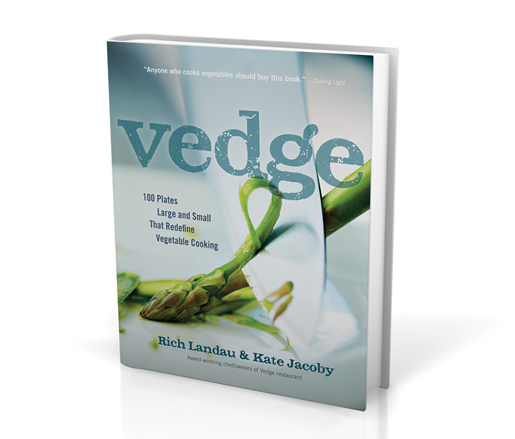
If there’s anyone who knows his vegetables, it’s chef Richard Landau. His mission to make vegetables that appeal to a carnivore’s palate has been wildly successful—he cooked the first vegan dinner at the Beard House and, along with wife Kate Jacoby, opened the acclaimed vegetarian restaurant, Vedge, in Philadelphia. The duo’s new cookbook, Vedge: 100 Plates Large and Small That Redefine Vegetable Cooking, offers innovative recipes, behind-the-scenes anecdotes, and useful tips to help any cook extract the most flavor and satisfaction out of a plant-based diet. Below, Richard shares his advice for taking the veggie plunge.
--
JBF: What are some essential pantry items for a vegetarian or vegetable-focused home cook?
Richard Landau: A great olive oil, fresh herbs, quality spices, and a great stock are essential. But most important, all of your ingredients should be high quality. When cooking without animal products, you don’t have meat fats, butter, cream, or cheese to hide behind—so all your products must be of the freshest and highest quality possible.
JBF: What are some indispensable spices or blends to keep handy?
RL: I always keep a jar of a Cajun or Southwestern blend at home, which are great for grilling and roasting. Also, a good curry powder and a few Middle Eastern blends (like za’atar or shawarma spice) are handy. Even if you’re not going in an ethnic direction, you can just use a little bit to add a subtle, exotic background flavor to your dishes.
JBF: Can you tell us about one or two dishes from your cookbook that would win over a die-hard skeptic?
RL: Almost all our food, both in the book and at the restaurant, is designed with omnivores in mind, but I’d recommend trying the trumpet mushroom B.L.T.s for satisfying simplicity, or the carrots with sauerkraut hummus for meaty, “deli” flavors.
JBF: What are some tips or strategies for transitioning to a more vegetable-focused diet?
RL: Don’t be ashamed to use some transitional products like veggie burgers or veggie bacon. Once you get into pure vegetable cooking, you’ll want to have lots of beans and grains on hand, since this will add a filling element to your dishes so that you’re not missing the animal protein. After that, make sure your dishes are full of flavor—then you’ll realize that meat is less about the flesh than it is about the seasonings and preparations.
JBF: What’s the biggest dietary or nutritional challenge for vegetarians, and do you have any tips for handling it?
RL: Just eat well and eat smart. French fries and eggplant parm may be vegetarian, but they’re not healthy foods to live on. You need to feel good when you’re done eating your meal, not heavy and bloated. Keep your food pure and light and within two weeks your body and palate will transform so you’ll no longer crave the foods that were making you unhealthy.
JBF: What do you think is the biggest misconception about vegetarian diets?
RL: That we’re all a bunch of Woodstock burnouts, eating only kale chips, sunflower seeds, and bean sprouts. It’s quite the opposite now—it’s actually become an upscale pursuit with the likes of Bill Clinton, Steve Wynn, and many other celebrities adopting this way of life that makes you feel and look great! So many people have changed their lives and health for the better because of a plant-based or plant-focused diet, it’s become a bit of a rock-star club that everyone wants to join.
About the author: Elena North-Kelly is associate editor at the James Beard Foundation. Find her on Twitter and Instagram.



-57 web.jpg)


